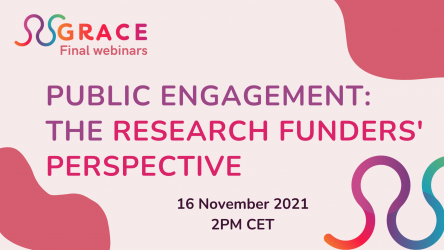- Video
Public engagement is emerging – alongside other RRI dimensions – as a key component in how research funding organisations are working to ensure that research is societally relevant and impactful: an explicit evaluation criterion in the awarding of research funding, or included as a requirement for qualitative research, or incentivised through other schemes and awards.
This webinar, organised as part of the GRACE project's final webinar series, focused on the perspective of research funders on public engagement, touching both on their responsibilities and initiatives in this area, and the expectations they have of the applicants and the research they fund. It featured presentations and a lively discussion from:
- Cédric Verstraete, Team Leader Policy and Monitoring, Innoviris, Belgium. Cédric coordinates the Policy and Monitoring department of Innoviris, the Brussels Capital Region’s public RDI funding organization. Cédric holds a bachelor’s degree in social work and obtained a PhD in sociology. Working for Innoviris, in his department, since 2016, he supports the general direction in delineating and monitoring the institution’s strategy, identifying regional RDI priorities based on participatory methods and designing the instutional policies on, inter alia, gender, open science and ethics. He helps to put RRI into practice, for instance by representing Innoviris in the ProEthics project, where funding agencies across Europe test new, ethical ways to involve citizens in decision making processes.
- Rosa Arias, CEO and Founder of Science for Change, Spain. A chemical engineer by training, she has over 15 years of experience as an expert on odours, and working in European projects (FP7, H2020, LIFE+). She advises the initiative “Science in Parliament”, which seeks to create a science office to inform the Spanish Parliament, and is a member of the board of directors of the European Citizen Science Association (ECSA). Passionate about the concept of Responsible Research and Innovation (RRI), citizen science and the role of women in science, Rosa coordinates the D-NOSES and NEWSERA projects and the Catalan cluster of the TRANSFORM project and acts as the main link between the different and powerful ‘Science for Change’ strategies to bring science closer to society and inform public policies.
To dive further into the topic of Public Engagement, you might also be interested in the related GRACE webinar 'Making the case for Public Engagement', as well as the Spokes collection on 'Participation and Co-creation'.

